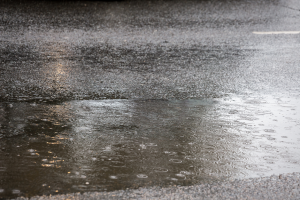08 Apr The Effects of Spring Rain on Asphalt Parking Lots in Orlando; Insight from an Orlando Asphalt Paving Company
 If your asphalt parking lot is not properly prepared, April showers could be a major hit to your budget in the form of expensive repairs. As a business owner or property manager, if you have not taken the necessary steps to protect your parking lot in Orlando, even a little bit of rain can begin to cause problems.
If your asphalt parking lot is not properly prepared, April showers could be a major hit to your budget in the form of expensive repairs. As a business owner or property manager, if you have not taken the necessary steps to protect your parking lot in Orlando, even a little bit of rain can begin to cause problems.
Therefore, it is extremely important for you to get the maintenance work needed to fix depressions, small cracks, and potholes. If left neglected, these could lead to some serious issues with your pavement.
In this post, we’ll answer some questions on how spring rain can affect your parking lot.
Why is water a problem for asphalt parking lots?
If your parking lot or pavement has small cracks, it becomes susceptible to the elements. The most destructive of all elements is water. Water has a tendency to slowly erode unprotected asphalt. Over time, it can seep into the structural layer and weaken the bond between the aggregate and the binder. Once the bond between the aggregate and the binder has weakened, it makes the asphalt more vulnerable to damage, compromising the structural integrity of the pavement.
How rain can damage your asphalt?
Rain, sleet, hail, etc., are all different forms of water that your asphalt pavement can be subjected to over the years. If your pavement or parking lot is left with even a small untreated crack, the rainwater can eventually penetrate the crack, causing it to widen. This will further compromise the sub-layer of the pavement, resulting in crocodile cracking. These types of cracks are both unappealing as well as unsafe.
What to look out for before calling for asphalt maintenance?
It is always more cost-effective and easier to repair a small crack before it turns into a bigger problem. If you find that there are currently no small cracks in your pavement, rainfall or standing water will most likely not be able to cause any damage. However, there are still a few things you should keep an eye out for and try to rectify:
- Pooling water
- Divots
- Surface slippage
- Cracking
- Imperfections on the surface
- Small potholes
- Puddles
Although surface cracks and potholes are obvious signs that a repair is necessary, standing water or puddles also shouldn’t be ignored. This could indicate a weakness in the sub-layer of the asphalt pavement.
What is the solution to prevent the impact of heavy rain on Orlando asphalt?
Water penetration can be avoided with a process known as sealcoating. With sealcoating, a protective liquid layer is applied on top of the asphalt pavement, protecting it from damage in the form of rain, UV rays, and fluids from other vehicles.
Sealcoating helps prevent the formation of any cracks, and therefore, does not allow rain to damage your pavement. In the State of Florida, it is recommended that sealcoating be done every 2-4 years to protect your asphalt parking lot.
Another important prevention technique is to plan for proper drainage during the lot construction process. When designing a parking lot, care should be taken by contractors to make sure that the lot slopes towards grassy areas or water outlets.
Looking to Protect Your Asphalt Parking Lot Pavement in Orlando?
Are you interested in protecting your parking lot from spring rainfall? If so, All Asphalt Services is ready to help. We have a team of seasoned Orlando asphalt paving professionals that are ready to serve you.
Whether you need a full inspection of your parking lot, or just want to learn more about the different preventive measures that you can take to protect your asphalt pavement, contact us today to request a free estimate!



No Comments